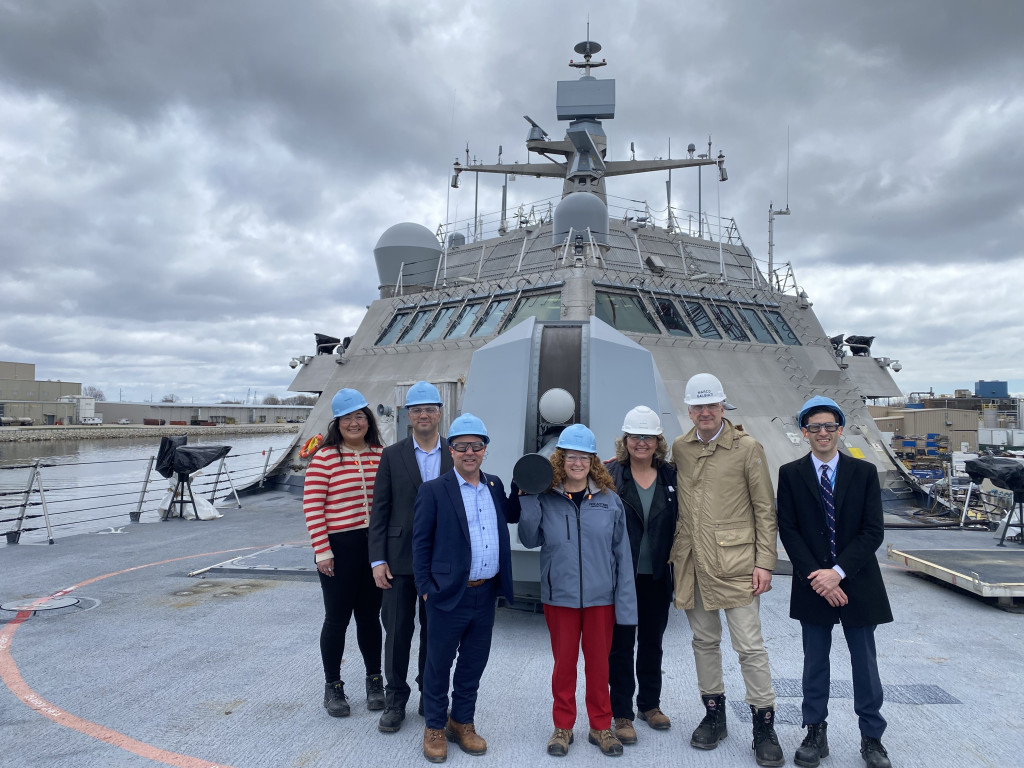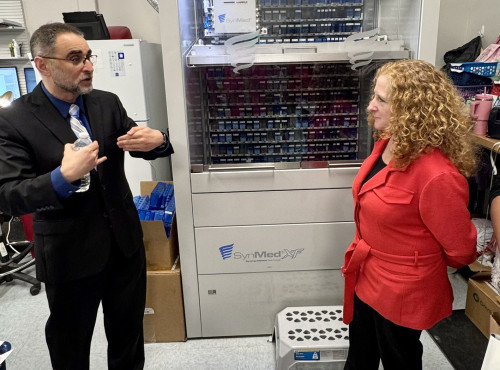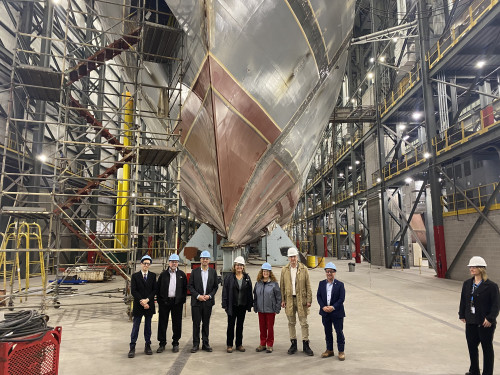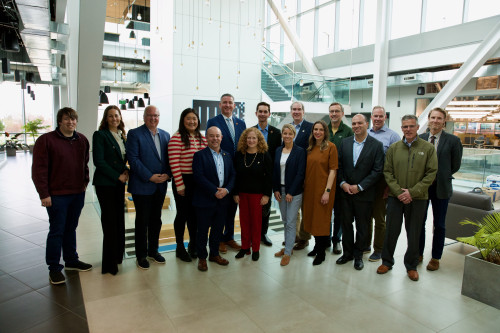From Milwaukee to Marinette, local partnerships power real solutions

Fincantieri Marinette Marine CEO Jan Allman and Fincantieri CEO Marco Galbiati joined Chancellor Mnookin and other leaders aboard a littoral combat ship produced for the U.S. Navy. Photo by Rodee Schneider
At a neighborhood pharmacy in Milwaukee, the University of Wisconsin–Madison is helping get life-saving opioid reversal kits into the hands of people who need them. In a Marinette shipyard, a partnership is opening new doors for engineering students to gain international experience.
Chancellor Jennifer L. Mnookin recently visited Milwaukee, Green Bay and Marinette for a close-up look at these connections that are delivering real results.
Across two trips, she met with healthcare providers, business leaders and other local partners to talk about how the university and Wisconsin communities can work together to address pressing challenges and create new opportunities.
Working together to confront the opioid crisis

Hayat Pharmacy is one of the statewide partners of the Wisconsin Opoid Overdose Response Center, which supports community pharmacies to reduce the number of opioid overdoses in Wisconsin. Photo by Anna Barry
During an April trip to Milwaukee, Mnookin visited Hayat Pharmacy, where the UW–Madison School of Pharmacy’s Wisconsin Opioid Overdose Resource Center is partnering to expand access to harm-reduction tools like naloxone and test strips. The statewide initiative now includes eight Hayat locations in Milwaukee alone.
“We believe that at the core of our university is the idea that we want to do research, teaching and public service to improve people’s lives,” Mnookin said during the visit. “And if helping to save lives and reduce some of the terrible costs of the opioid epidemic isn’t worth doing, I don’t know what is.”
Later, she stopped at Aurora Sinai Medical Center, one of nearly 50 Milwaukee-area health sites where UW–Madison students are gaining clinical training. Through programs like Training in Urban Medicine and Public Health (TRIUMPH), students in medicine, nursing and pharmacy learn to serve urban communities with hands-on, community-based experience.
Strengthening local economies and building the workforce
The Milwaukee trip highlighted UW–Madison’s economic and workforce ties to the region. Last year, the university partnered with more than 90 county employers to provide professional development programs in fields ranging from business to engineering. More than 19,000 UW alumni also live and work in the county.
On May 2, Mnookin traveled to northeast Wisconsin, where conversations focused on workforce development and entrepreneurship. At Fincantieri Marinette Marine, she toured the shipyard and met with leadership to learn more about their growing collaboration with UW–Madison’s College of Engineering. The partnership is helping connect students with global experiences: This past summer, four UW–Madison engineering students traveled to Italy for a two-month internship with Fincantieri’s naval engineering team. The partnership is set to continue this summer.

Chancellor Mnookin and other UW leaders toured the Fincantieri Marinette Marine shipyard. Photo by Rodee Schneider
“It was inspiring to see firsthand the scale and sophistication of the work being done at Fincantieri Marinette Marine,” Mnookin said. “This partnership creates meaningful opportunities for our students to apply their engineering skills in real-world, high-impact settings right here in Wisconsin and around the world.”
Advancing innovation and access
In Green Bay, Mnookin met with community leaders and business partners involved in entrepreneurship and economic development. Local venture fund TitletownTech, a partnership between the Green Bay Packers and Microsoft, has invested in several startups connected to UW–Madison, including companies working on computer vision and fusion energy.

Area legislators and several startup founders joined Chancellor Mnookin for the TitletownTech visit in Green Bay. Photo by Madilyn Heinke
The visit comes as UW–Madison recently launched a new effort to boost entrepreneurship on campus. The goal is to strengthen campus programs, support founders and expand access to resources that help turn ideas into startups.
Across all the visits, the importance of access and affordability was front and center. More than 2,750 undergraduates from Brown, Marinette and Milwaukee counties are currently enrolled as students, with nearly 700 attending tuition-free through programs like Bucky’s Tuition Promise and the Badger Promise. After graduation, many of those students will return to their hometowns to fill in-demand jobs and start new businesses.
With the semester winding down, UW–Madison leaders are set to continue visiting communities across the state this summer, part of the university’s ongoing effort to help address the challenges shaping Wisconsin’s future.
Tags: chancellor, outreach




